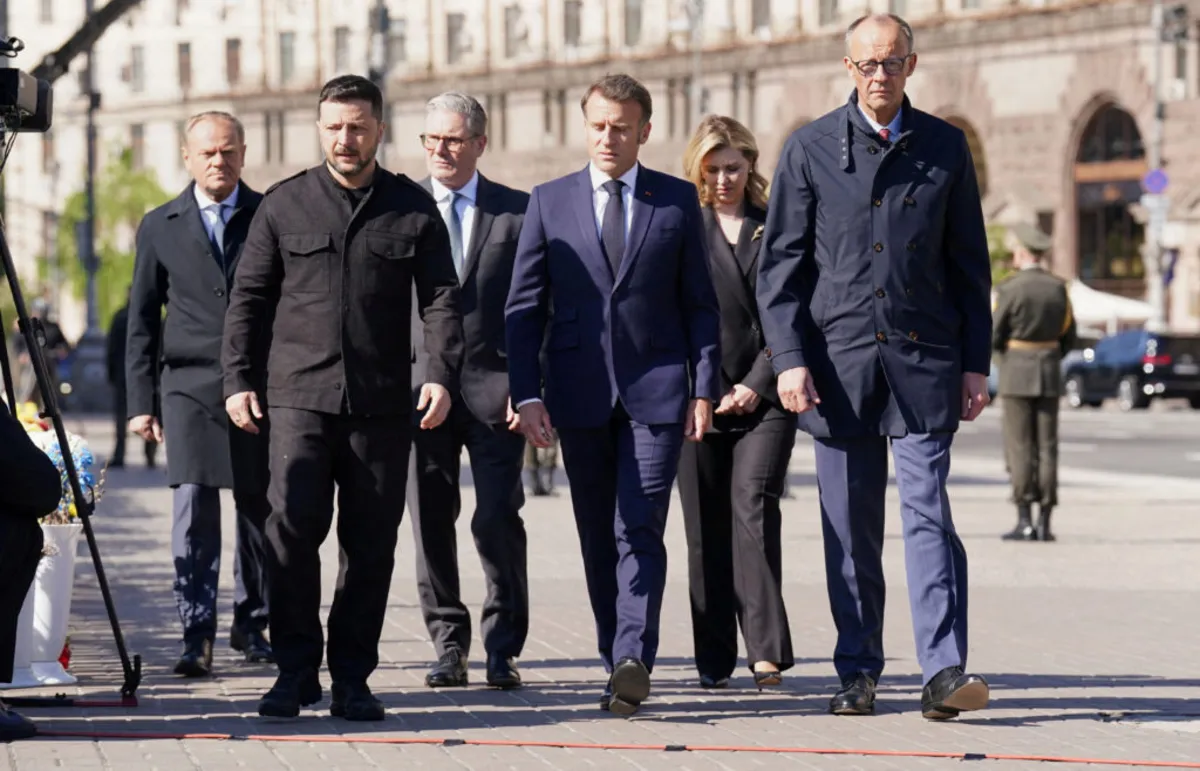
In a significant diplomatic move, leaders from four major European nations have united to apply pressure on Russian President Vladimir Putin to accept an unconditional 30-day ceasefire in Ukraine. This offer was made during a meeting held on Saturday, marking a strong display of solidarity with Kyiv. The leaders involved include France, the United Kingdom, Germany, and Poland, who collectively endorsed a ceasefire proposal scheduled to commence on Monday. Notably, U.S. President Donald Trump was briefed on this initiative via a phone call earlier in the day, indicating transatlantic support.
As of now, there has been no immediate response from Moscow regarding the ceasefire proposal. This comes shortly before the expiration of Russia's own unilateral three-day ceasefire, which was declared to commemorate the 80th anniversary of victory over Nazi Germany. However, Ukrainian officials have accused Russian forces of repeatedly violating this ceasefire, with reports indicating over 700 violations.
Ukrainian President Volodymyr Zelenskyy expressed optimism about the meeting, calling it “a very important signal” of support from European allies. French President Emmanuel Macron stated that the U.S. would take the lead in monitoring the proposed ceasefire, with backing from European nations. He warned of “massive sanctions” that are prepared and coordinated between European and American allies should Russia fail to comply with the truce.
Macron, alongside British Prime Minister Keir Starmer, German Chancellor Friedrich Merz, and Polish Prime Minister Donald Tusk, emphasized that the European nations are committed to standing by Ukraine. Starmer remarked, “This is Europe stepping up, showing our solidarity with Ukraine.” Retired Lt. Gen. Keith Kellogg, who served as Trump’s special envoy to Ukraine and Russia, highlighted that a comprehensive ceasefire would initiate efforts to conclude the ongoing conflict, which has become the largest and longest war in Europe since World War II.
Despite these efforts, progress in resolving the three-year war has been slow, particularly since Trump resumed his presidency. Previous assertions of imminent breakthroughs have not materialized, and the Kremlin continues to demand terms more favorable to its interests. Since the initiation of U.S.-mediated negotiations, Russian attacks along the extensive 1,000-kilometer front line have persisted, including lethal strikes on civilian areas devoid of military targets.
European leaders have threatened to escalate sanctions against Russia, particularly targeting its energy and banking sectors, if President Putin does not adhere to the ceasefire agreement. Ukrainian Foreign Minister Andrii Sybiha emphasized the need to make continued conflict prohibitively expensive for Russia. When questioned about how the monitoring of the ceasefire would be executed, Sybiha indicated that discussions were ongoing.
Amid skepticism regarding the effectiveness of new sanctions against Moscow, Merz assured that “almost all member states of the European Union and a large coalition of the willing around the world are determined to enforce these sanctions,” even if the latest ceasefire initiative does not succeed.
Furthermore, discussions regarding security guarantees for Ukraine have taken place. Strengthening Ukraine’s military capabilities will be essential in deterring future Russian aggression. Macron mentioned the possibility of deploying foreign troops to Ukraine as an additional measure of reassurance, though he noted that details are still being finalized. Notably, there was no mention of NATO membership, which remains Ukraine’s primary preference for security guarantees.
On the ground, Russian shelling in Ukraine's northern Sumy region recently resulted in the deaths of three civilians and injuries to four others. In the southern city of Kherson, a drone strike carried out by Russian forces claimed another civilian life, according to Governor Oleksandr Prokudin. The U.S. Embassy in Kyiv has cautioned of a “potentially significant” Russian air attack in the coming days, although specific details remain undisclosed.
In a related development, the Russian military provided the U.S. with a brief advance warning before launching a strike on Ukraine using its Oreshnik intermediate-range ballistic missile—an experimental hypersonic weapon. Ukrainian social media channels have associated the embassy’s warnings with reports of an anticipated flight ban over the Kapustin Yar military training and rocket launch complex, a precursor to previous strikes.
Trump has expressed doubt regarding Putin’s willingness to end the conflict in Ukraine, casting skepticism on the likelihood of achieving a peace deal in the near future while hinting at additional sanctions against Russia. The fate of Ukraine is seen as critical to the security of the European continent, leading to increased pressure on its allies to provide military support, regardless of any shifts in U.S. administration policies.
As the situation continues to evolve, the international community watches closely, hoping for a resolution that prioritizes peace and stability in the region.